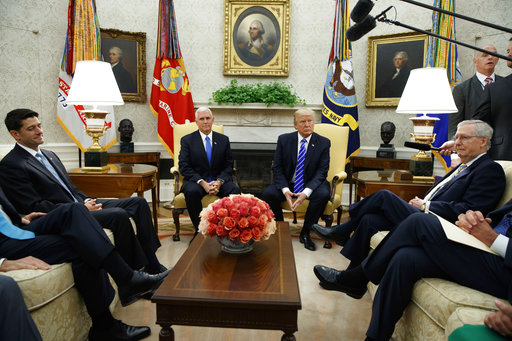WASHINGTON — Veteran Republicans are bailing on Congress in growing numbers, as GOP control of Washington fails to produce the unity or legislative successes party leaders wish for. With President Donald Trump willing, if not eager, to buck fellow Republicans and even directly attack them, a number of lawmakers no longer wish to be involved.

In this Sept. 6, 2017, photo, President Donald Trump pauses during a meeting with Congressional leaders in the Oval Office of the White House. From left, Speaker of the House Paul Ryan, R-Wis., Vice President Mike Pence, Trump, and Senate Majority Leader Mitch McConnell, R-Ky. AP
The latest was two-term Rep. Dave Trott of Michigan, who said in a statement Monday that he’d decided after careful consideration that the best course for him was to spend more time with his family and return to the private sector.
In contrast to those diplomatic words was Trott’s most recent tweet, sent in mid-August: “I think America needs more unity and less divisiveness…meaning @realDonaldTrump should focus more on golf & have less press conferences.”
Trott joins a string of moderate Republicans, including Reps. Charlie Dent of Pennsylvania, Dave Reichert of Washington state and Ileana Ros-Lehtinen of Florida, who are not seeking re-election.
Each of these seats will be heavily contested by Democrats eager to take back control of the House, and rumors abound of other GOP retirements still to come. New Jersey’s Leonard Lance is weighing retirement, while another Michigan Republican, Rep. Fred Upton, is mulling a campaign for U.S. Senate, according to party operatives who spoke on condition of anonymity to discuss private deliberations.
The developments have alarmed GOP operatives concerned that the trickle of retirements could turn into a flood unless congressional Republicans and Trump can come together and produce on their promises, particularly by overhauling the tax code. And, with Trump bypassing Republicans to make deals with Democrats, and encouraging primary challenges against sitting GOP senators, the retirement decisions also reflect concerns among some about whether they will get party support when they need it, especially with former Trump adviser Steve Bannon threatening all-out war on congressional leadership.
“There are some stability concerns in the party about whose team everyone is on,” said Josh Holmes, a GOP consultant and former chief of staff to Senate Majority Leader Mitch McConnell, R-Ky. “Concerns about whether your party is really with you.”
It all illustrates that, far from producing unity within the Republican Party, the Trump era appears to be exacerbating existing GOP divisions while creating new ones. The familiar divide between pragmatic and ideologically driven Republicans has been heightened, while Trump’s deal-making with top Democrats last week is forcing elected Republicans to choose sides between Trump and GOP leaders McConnell and House Speaker Paul Ryan.
“The party never united around Trump as it would another nominee, let alone president, and Trump is not a limited government conservative,” said Alex Conant, a former top aide to Sen. Marco Rubio, R-Fla. “And so he is not a traditional Republican and as a result is going to clash with the traditional Republicans that fill the ranks of Congress.”
The chaos and uncertainty produced by Trump and his orbit would be more acceptable to congressional Republicans if the party was achieving legislative success. Instead, its long-standing promise to repeal and replace Barack Obama’s health care law collapsed on the Senate floor in July, while other priorities are moving slowly. As a result, a number of Republicans on and off Capitol Hill have come to view tax reform of some kind as a must-pass priority, without which the dam would likely break on retirements and Republicans would be in serious jeopardy of losing control of the House.